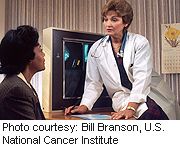U.S. Panel Rejects Ovarian Cancer Screens for Low-Risk WomenRenewing prior recommendations, experts say current tests not worth it for most.By Amanda Gardner 
MONDAY, Sept. 10 (HealthDay News) -- A leading U.S. government panel has recommended against ovarian cancer screening for women who are not at high risk for the disease. The blood test and transvaginal ultrasound that are currently used to spot ovarian cancer may cause more harm than benefit for those patients, according to final guidelines issued Monday by the U.S. Preventive Services Task Force. Women who have the genetic mutations (BRCA1/BRCA2) or family histories that raise their chances of developing ovarian cancer should be referred for genetic testing and counseling, the recommendations add. These latest guidelines, which were also published Sept. 11 in the Annals of Internal Medicine, mirror those set by the task force back in 2004. "There is no existing method of screening for ovarian cancer that is effective in reducing deaths," Dr. Virginia Moyer, chair of the U.S. Preventive Services Task Force, said in a USPSTF statement issued Monday. "In fact, a high percentage of women who undergo screening experience false-positive test results and consequently may be subjected to unnecessary harms, such as major surgery," she said. "In light of this, there is a critical need to develop better screening tests for ovarian cancer," Moyer added. Experts agreed that effective tests to screen for ovarian cancer are desperately needed. "It is very important that the population at large understands that screening with [ultrasound] and CA 125 is not beneficial at this time," said Dr. Diana Contreras, director of gynecologic oncology at Long Island Jewish Medical Center in New Hyde Park, N.Y. "It is clear new avenues need to be pursued, and women need to insist that more research is performed attempting to find an adequate screening mechanism so that ovarian cancer can be detected at a curable stage." In addition, Dr. Elizabeth Poynor, a gynecologic oncologist and pelvic surgeon at Lenox Hill Hospital in New York City, said: "The task force statement highlights the need for innovations and ongoing clinical investigation in ovarian cancer screening techniques. Women should review with their health care providers the early warning signs and symptoms of ovarian cancer, as well as their family and personal health histories in order to develop individualized strategies for risk reduction. Women should be offered participation in clinical trials in ovarian cancer screening, when available and appropriate," she added. Dr. David Grossman, a member of the task force and senior investigator with Group Health Research Institute in Seattle, said that "the tests that we have, unfortunately, just aren't very accurate and, with a lot of false positives, a lot of women get harmed with unnecessary biopsies and surgeries." A large study published last year found no difference in mortality between women who were randomly assigned to receive a blood test plus the ultrasound compared to those who had "usual care." What's more, some 10 percent of women who underwent screening received a false-positive result and one-third of these had an ovary removed unnecessarily. Another study estimated that 33 surgeries were needed to diagnose one case of ovarian cancer using the blood test/ultrasound screening. Preliminary data from yet another trial, ongoing in the United Kingdom, also turned up false-positive results in about 10 percent of women undergoing screening. Half of those women had surgery and about 4 percent of these experienced a major complication from the surgery. Like many screening tests, the blood test plus ultrasound for ovarian cancer "doesn't work, is potentially dangerous and also costs a lot of money," said Dr. Jay Brooks, chairman of hematology/oncology at Ochsner Health System in Baton Rouge, La. "You're giving people a false sense of security, and it creates a lot of false positives, which ultimately results in a lot of unnecessary surgeries." The task force's recommendations are also in line with recommendations from the American Cancer Society and the American Congress of Obstetricians and Gynecologists (ACOG), Grossman said. This leaves women with no good test to screen for ovarian cancer, considered a "silent killer" because symptoms are often noticed too late to be treatable. And there are no other techniques on the horizon, Grossman added. More information The U.S. National Cancer Institute has more on ovarian cancer. (SOURCES: Virginia Moyer, M.D., chair, U.S. Preventive Services Task Force; Diana Contreras, M.D., director, gynecologic oncology, Long Island Jewish Medical Center, New Hyde Park, N.Y.; Elizabeth Poynor, M.D., gynecologic oncologist and pelvic surgeon, Lenox Hill Hospital, New York City; Jay Brooks, M.D., chairman, hematology/oncology, Ochsner Health System, Baton Rouge, La.; David Grossman, M.D., senior investigator, Group Health Research Institute, Seattle, and member, U.S. Preventive Services Task Force; Sept. 10, 2012, Annals of Internal Medicine, online) Copyright © 2012
HealthDay. HealthDayNews articles are derived from various sources and do not reflect federal policy. healthfinder.gov does not endorse opinions, products, or services that may appear in news stories. For more information on health topics in the news, visit Health News on healthfinder.gov. |